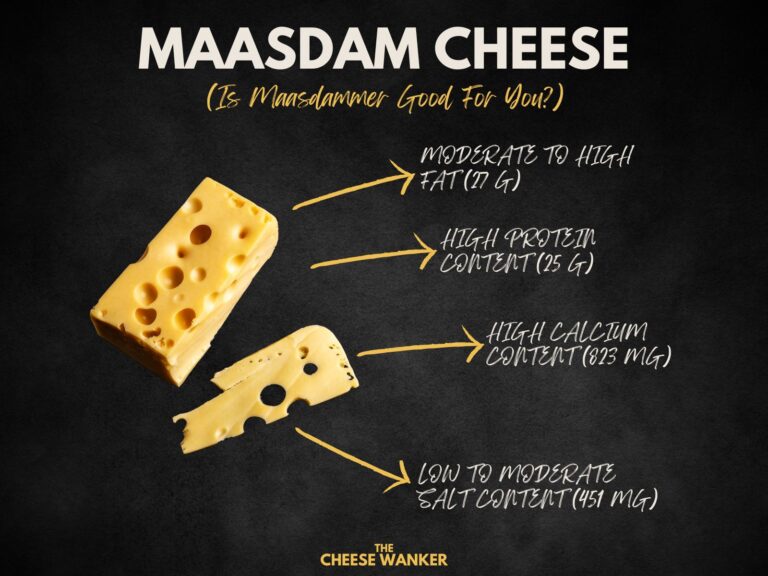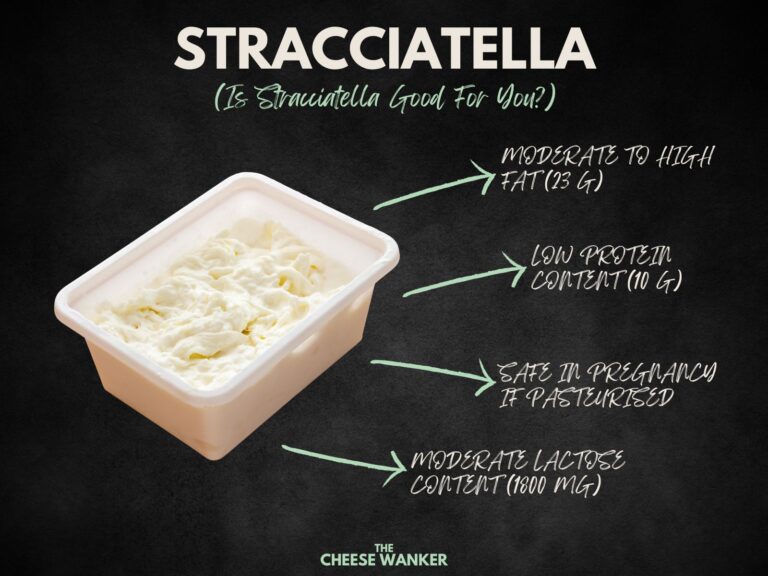Muenster is a creamy delight that graces many delis around the United States. But beyond its delicious taste and texture, understanding its nutritional profile is crucial for making informed dietary choices. In this article, we delve into the science behind Muenster, examining its nutrition facts. Read on to find out if Muenster is bad for your health.
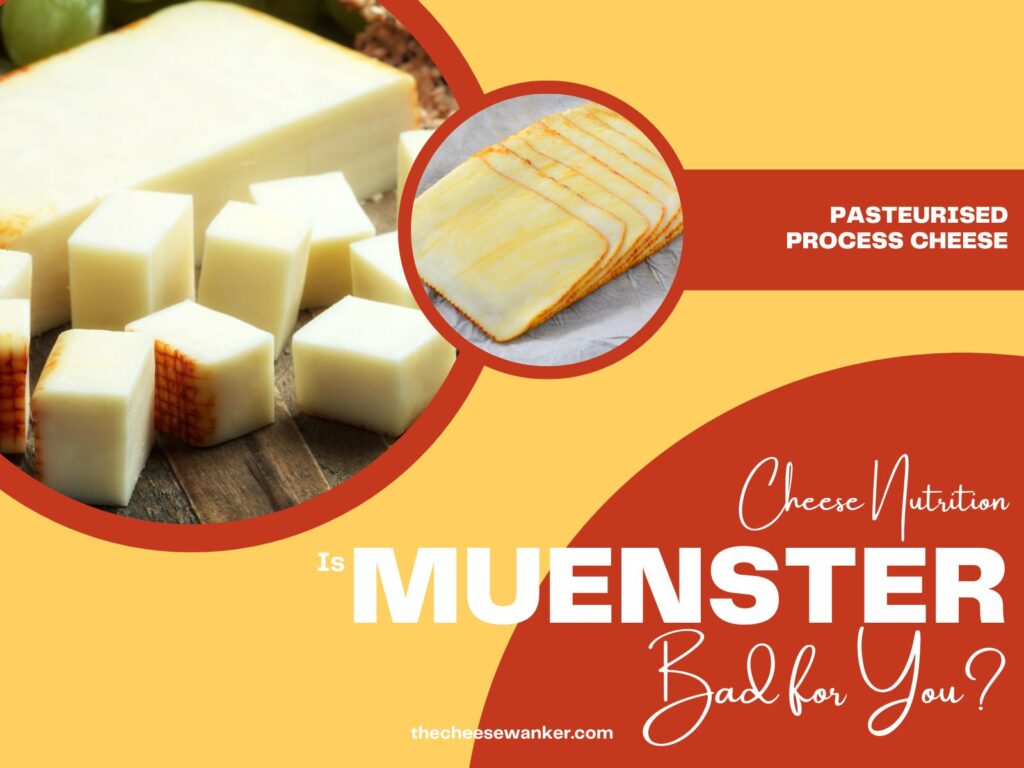
SEE ALSO: Nutrition facts for popular world cheeses in The Cheese Wanker’s index →
What is Muenster?
While Muenster might bear a name reminiscent of the picturesque Munster Valley in France, its journey and composition have taken a different path. Muenster, as we know it today, is a pasteurised process cheese that has carved its niche delis around the USA.
Unlike its traditional French counterpart, Muenster undergoes a meticulous process that involves pasteurisation, transforming it into a smooth and creamy delight.
This pasteurised process imparts Muenster with a texture that is both creamy and consistent, a characteristic that has endeared it to cooks and cheese enthusiasts around the world.
Moreover, its ability to melt smoothly, making it perfect for sandwiches, casseroles and other culinary creations, has contributed to its popularity in modern kitchens.
Nutrition fact sheet
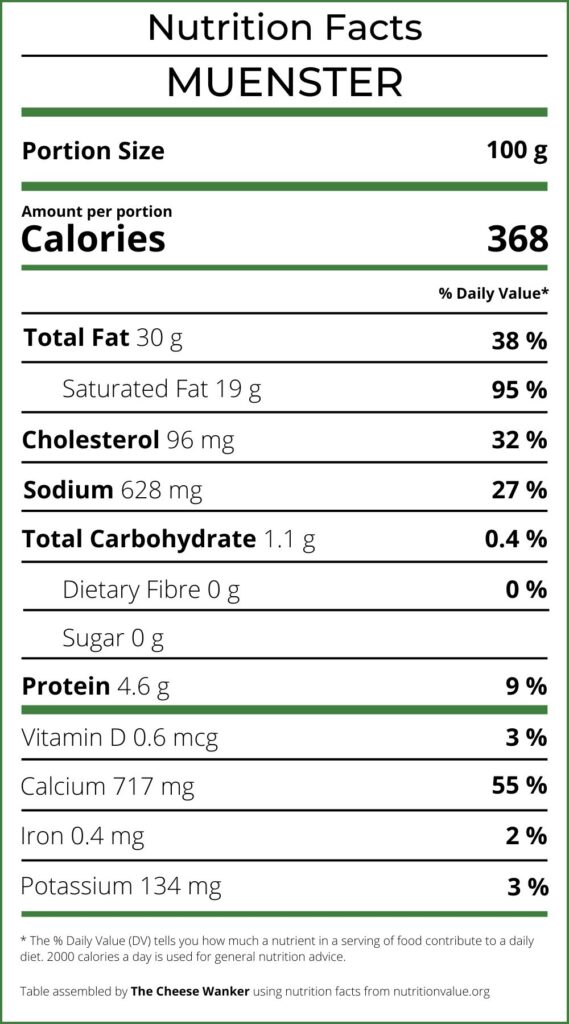
Country of origin
United States of America
Type of Cheese
Pasteurised Process Cheese
Milk
Cow (Pasteurised)
Examples
Shullsburg Creamery, Wisconsin Cheese Muenster
Benefits
Low Lactose Levels, Moderate to High Calcium Levels
Considerations
Milk Protein Intolerance, Moderate to High Saturated Fats Levels, High Sodium Levels, Not Recommended in Pregnancy
Nutritional review for Muenster
Eating healthy plays a pivotal role in maintaining overall well-being and preventing chronic diseases. A balanced and nutritious diet provides our bodies with essential vitamins, minerals, and macronutrients, fuelling optimal physical and cognitive function.
With this in mind, let’s have a look at some of the key nutrition facts for Muenster.
Calorie Count
Calories serve as the energy currency of our bodies, fuelling every aspect of our lives. With 368 calories per 100 grams, Muenster cheese offers a substantial energy boost, but the key lies not just in the quantity but in the quality of these calories.
Quality calories, often referred to as nutrient-dense calories, signify the presence of essential nutrients within the food. In the case of Muenster cheese, while it contributes to your daily caloric intake, it also provides valuable nutrients like protein, calcium, and certain fats. These nutrients play vital roles in our body, supporting functions ranging from bone health to cellular repair.
Incorporating it into your diet in moderation can add richness to your meals without overwhelming your caloric intake. Being calorie-conscious doesn’t mean abstaining from indulgent foods; instead, it encourages a balanced approach where treats like Muenster cheese are enjoyed thoughtfully and in appropriate portions.
Fat Content
Fat, often a contentious topic in the realm of nutrition, is a fundamental component of our diet. In the case of Muenster, the fat content stands at 30 grams per 100 grams, making it a significant aspect of its nutritional profile.
However, not all fats are created equal, and understanding the types of fats in Muenster cheese sheds light on their impact on our health.
Muenster cheese comprises a mix of fats, including both saturated and unsaturated fats. Saturated fats, found in animal products like cheese, have long been associated with health concerns when consumed excessively. These fats, if consumed in large quantities, can contribute to elevated cholesterol levels and cardiovascular issues.
However, moderation is key. In controlled amounts, saturated fats can be part of a balanced diet, providing a source of stable energy for the body.
In contrast, unsaturated fats, including monounsaturated and polyunsaturated fats, are considered heart-healthy fats. These fats, found in various foods like avocados, nuts, and certain vegetable oils, have been linked to improved heart health and reduced inflammation.
While Muenster cheese does contain some unsaturated fats, it’s crucial to be mindful of the overall intake, balancing it with other sources of healthy fats to promote overall well-being.
You can learn more about the different types of fat in cheese and which cheeses have the lowest fat content here.
Protein Content
In the realm of proteins, Muenster stands as a modest but meaningful contributor. With 4.6 grams of protein per 100 grams, it offers a valuable nutrient source. Proteins, the essential building blocks of life, play pivotal roles in tissue repair, enzyme function, and overall body maintenance.
While Muenster cheese may have a lower protein content compared to some non-processed cheeses, it remains a noteworthy protein source due to its complete amino acid profile.
The protein in Muenster cheese comprises essential amino acids, making it a complementary protein source within a diverse diet. Understanding that proteins are vital for cellular repair and rejuvenation underscores the importance of incorporating Muenster cheese alongside other protein-rich foods in a balanced diet.
While it might not be a primary protein source, its inclusion adds both flavour and nutritional value to meals, making it a welcome addition for those seeking a balanced and varied diet.
Want to find out which cheeses have the highest protein content? Click here for our blog post covering cheeses with the highest protein content.
Cholesterol Content
Muenster cheese contains 96 mg of cholesterol per 100 grams, raising questions about its impact on overall health. However, it’s essential to approach this aspect with a nuanced perspective.
Dietary cholesterol, once viewed as a significant health concern, is now understood in a more complex light. While excessive intake of dietary cholesterol can affect blood cholesterol levels for some individuals, it’s not universally harmful.
Cholesterol plays a crucial role in various bodily functions, including hormone production and cell membrane stability. The body tightly regulates cholesterol levels, adjusting its production based on dietary intake.
For many individuals, moderate consumption of cholesterol-rich foods, like Muenster cheese, does not significantly impact overall health. Understanding the difference between ‘good’ (HDL) and ‘bad’ (LDL) cholesterol and focusing on a balanced diet and lifestyle factors such as exercise, are key elements in maintaining a healthy cholesterol profile.
Therefore, while mindful consumption is wise, Muenster cheese can be enjoyed as part of a balanced diet without causing undue concern about cholesterol levels.
You can learn more about the impact of dietary cholesterol on blood cholesterol levels in our dedicated post here.
Salt Content
Muenster’s salt content averages at around 630 mg per 100 grams, infusing it with its distinctive savoury taste. While salt enhances flavour, excessive intake can pose health risks, particularly concerning blood pressure and cardiovascular health.
It’s crucial to understand the balance between the flavour-enhancing role of salt and its potential impact on the body.
Excessive salt intake can lead to hypertension, a major risk factor for heart disease and stroke. Individuals with existing heart conditions or high blood pressure should be especially cautious.
However, moderate consumption of Muenster, along with an awareness of overall sodium intake from various sources, allows individuals to enjoy its taste without compromising their health.
By being mindful of portion sizes and incorporating salt-rich foods judiciously, you can enjoy Muenster while maintaining a balanced approach to your overall sodium intake.
You can read more about why salt is important in cheesemaking in our comprehensive post here.
Calcium Content
Muenster offers a noteworthy calcium content of 717 mg per 100 grams, providing a valuable contribution to bone health. While Muenster is a good calcium source, it’s essential to acknowledge its place within a balanced diet.
Calcium is vital for bone development, making it crucial for growing children and adolescents. Additionally, as people age, maintaining adequate calcium intake becomes essential in preventing osteoporosis and maintaining bone density.
While Muenster provides calcium, it’s important to diversify calcium sources, incorporating other dairy products, leafy greens and fortified foods.
By enjoying Muenster in moderation alongside a varied diet, you can support your calcium needs while appreciating its rich, creamy flavour. Awareness of calcium intake is key, ensuring optimal bone health without overindulging in any single food source.
Get our complete guide to calcium content in cheese in this post here.
Safety in Pregnancy
When it comes to pregnancy, safety is paramount. Muenster, being pasteurised, is generally considered safe for consumption during pregnancy due to the elimination of harmful bacteria. However, the nutritional profile of Muenster cheese warrants consideration.
While pasteurisation ensures the cheese is free from harmful microbes, the high calorie, fat, and sodium content in Muenster might not align with the specific dietary needs of expectant mothers.
During pregnancy, nutrient-dense foods are crucial to support the developing baby and the mother’s health. Consulting a healthcare professional for dietary advice is essential, as they can provide tailored guidance, ensuring both the mother and the child receive the necessary nutrients without compromising health.
You can read more about which cheeses you can eat when you’re pregnant by clicking here.
Lactose Intolerance
Lactose intolerance stems from the body’s inability to fully digest lactose, the sugar found in dairy products. Muenster, having undergone processing, contains lower lactose levels than fresh dairy products.
For mildly lactose-intolerant individuals, consuming Muenster in moderation might be manageable. Experimentation and self-awareness are crucial; some may find they can enjoy Muenster without discomfort, while others might need to exercise more caution.
Additionally, lactase supplements, which aid in lactose digestion, can be considered for those who want to enjoy Muenster without the typical discomfort. Ultimately, understanding one’s tolerance level and seeking tailored solutions ensures that Muenster can be enjoyed without compromising digestive well-being.
Conclusion
As we unravel the layers of Muenster’s nutrition facts, one resounding theme emerges: moderation. Within every creamy bite lies a reminder that indulgence can coexist with awareness, and that savouring Muenster is best done in mindful quantities.
Understanding the caloric density, fat composition, protein balance and essential nutrients within Muenster serves as our compass. It guides us towards appreciating this processed delicacy not as a forbidden treat, but as a culinary delight to be enjoyed responsibly.
By embracing moderation, we transform a simple slice of cheese into a conscious choice. Let it be a reminder that in the realm of gastronomy, as in life, the key to true enjoyment lies in the delicate art of balance.
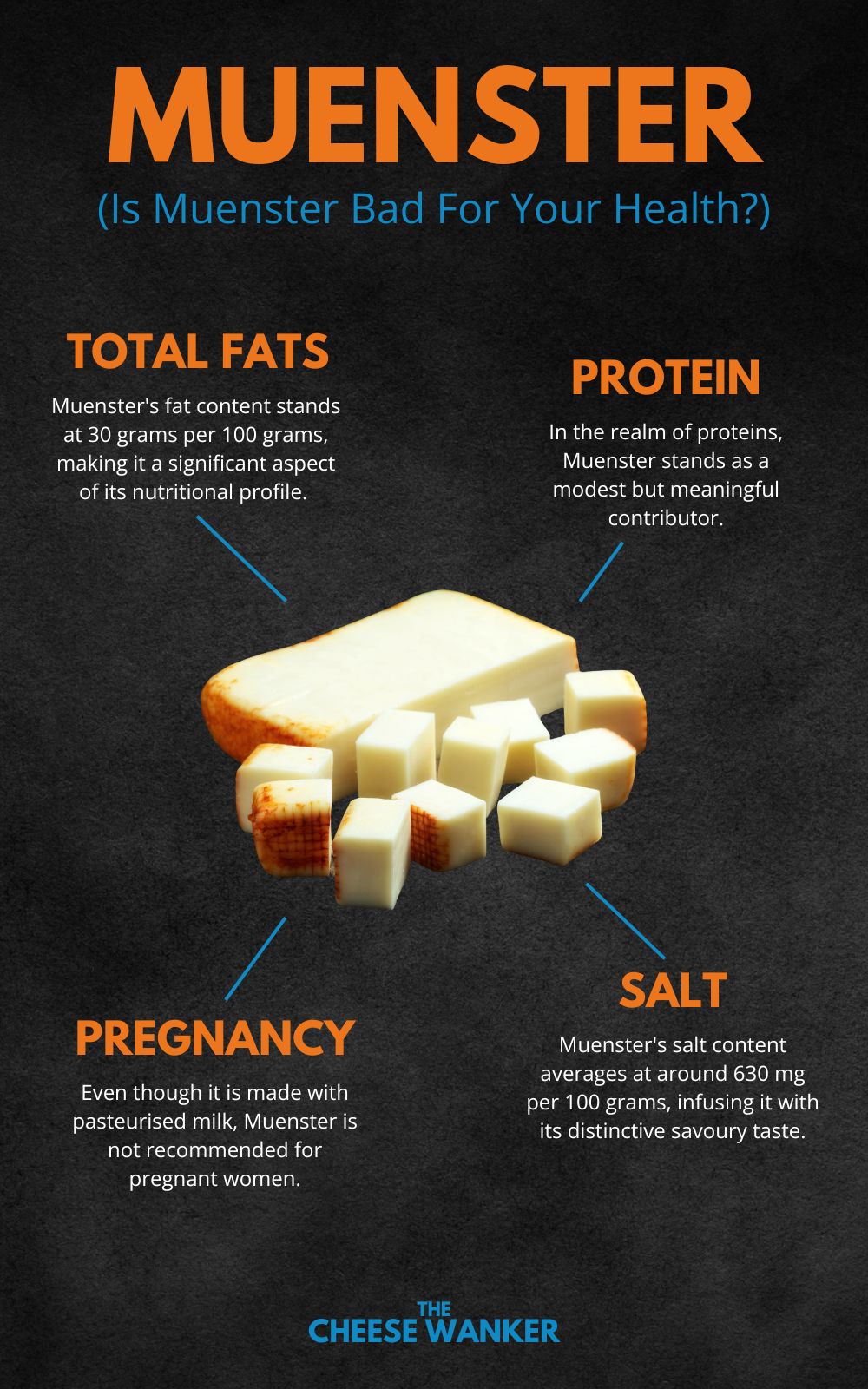
References
Overall nutritional content
The nutritional content of cheese in our table comes from the USDA Food Data Central Repository, the Australian Food Composition Database and cheese manufacturers. We realise that there can be variations between different brands and producers. Hence, the numbers we have used are averages.
Fat content
Our fat RDI data comes from Cleveland Clinic’s Healthy Fat Intake resource.
Type of fat in cheese as per Harvard T.H. Chan’s The Nutrition Source.
Protein content
Our protein RDI data comes from Harvard Medical School’s Harvard Health Publishing.
Cholesterol content
Is There a Correlation between Dietary and Blood Cholesterol? Evidence from Epidemiological Data and Clinical Interventions? – Maria Luz Fernandez and Ana Gabriela Murillo
Saturated fat, carbohydrate, and cardiovascular disease – Patty W Siri-Tarino, Qi Sun, Frank B Hu and Ronald M Krauss
Effect of cheese consumption on blood lipids: a systematic review and meta-analysis of randomized controlled trials – Janette de Goede, Johanna M Geleijnse, Eric L Ding, Sabita S Soedamah-Muthu
Safety in pregnancy
All the advice relating to what cheeses you can eat during pregnancy in this article is based on the recommendations by health authorities in Australia, the UK and the USA. If you are unsure about what you can or cannot eat, please consult your doctor.
Australia – FSANZ, United Kingdom – NHS and United Sates of America – FDA
Lactose content
Lactose residual content in PDO cheeses
Detection of lactose in products with low lactose content
The analysis of lactose in milk and cheese products by HPLC
Food Standards ANZ Food Composition Database
Lactose & Galactose content of cheese

